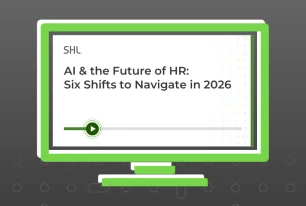Not All Skills Are Created Equal – Why It’s Time to Rethink Your Talent Strategy
The skills landscape is shifting faster than ever, yet many businesses still rely on outdated hiring and mobility strategies. Understanding the difference between perishable, semi-durable, and durable skills is critical to building a future-ready workforce.
Share
The skills evolution is outpacing business strategy
Skills are evolving at an unprecedented rate, yet many companies don’t realize how future-proof their workforce skills might be, or have a clear understanding of the capabilities of their talent. The traditional focus on hard skills in hiring and internal mobility is risky—what was essential yesterday may be obsolete tomorrow. To stay competitive, businesses must rethink how they assess, develop, and mobilize talent.
More than a third of workers say they have skills that are not clear from their qualifications, job history, or job title, meaning reliance on job titles or outdated job descriptions won’t provide an accurate reflection on the skills of your talent.
The risk of over-reliance on the wrong types of skills
Not all skills contribute equally to workforce agility. Some are essential for performing a job today, while others enable adaptability and long-term mobility. To first understand how to move forward, it is useful to understand three types of skills.
- Perishable skills: Short lifespan, frequently evolving technology or system related skills, especially those related to specific vendors, platforms or languages.
- Examples: Microsoft Office, coding languages, Salesforce.
- Examples: Microsoft Office, coding languages, Salesforce.
- Semi-Durable skills: Field-specific technologies or processes which regularly update with industry shifts.
- Examples: Marketing concepts, cloud computing, coaching methodologies.
- Examples: Marketing concepts, cloud computing, coaching methodologies.
- Durable skills: Measurable and long-lasting behavioral skills developed through experience and not tied to specific industries or job function.
- Examples: Adapts to change, analyzes information, puts the team first.
Skills are 5x more predictive of a person’s future performance than their education.
Many organizations over-prioritize technical or perishable skills—those that are perceived to be easier to define, measure, and hire for— leading to a workforce that is constantly playing catch-up and a risk of endless costly hiring cycles.
Businesses should ask themselves, are you hiring for today’s needs or building a workforce that can adapt to tomorrow’s challenges?
A smarter approach to skills strategy
A future-ready workforce doesn’t just happen. It is built through intentional skills investment. A skills-based approach helps organizations assess readiness, plan for change, and build a workforce that’s ready for tomorrow. With objective skills data and an understanding of the types of skills data that are measured, companies can avoid the risk of making talent decisions based on bias, guesswork, or outdated information.
Rethinking talent strategy means prioritizing durable skills while creating pathways for ongoing development. To make skills truly actionable, organizations need a structured way to define and measure behavioral strengths and apply them across roles, industries, and career paths.
Organizations can then proactively identify talent, focus development investment and unlock growth for employees before the skills deficit becomes insurmountable. On an individual level, understanding behavioral skills unlocks potential, guides career pathways and ensures workforce planning decisions are based on objective data, not assumptions.
With data-driven skills intelligence, companies gain a competitive edge by creating a workforce that can be upskilled, reskilled and redeployed with ease.
Read our Strategic Guide to Internal Hiring and Mobility for more on how to build a scalable, skills first workforce strategy across hiring, development and redeployment.









